Help! My Dog Is Peeing For Attention
Dogs were essentially intended to be our ultimate friends, so owning a fur baby comes with a slew of feel-good perks. But what about when they do something inconvenient, like peeing on the floor? You would be hard-pressed to find a single dog owner that never had to clean up pee!
In reality, there can be many reasons why a dog might pee indoors, but seeking attention is rarely one of them! Let’s take a closer look at some of the most common reasons dogs have the “oopsies” in the house and what you can do to stop this harmless but annoying behavior.
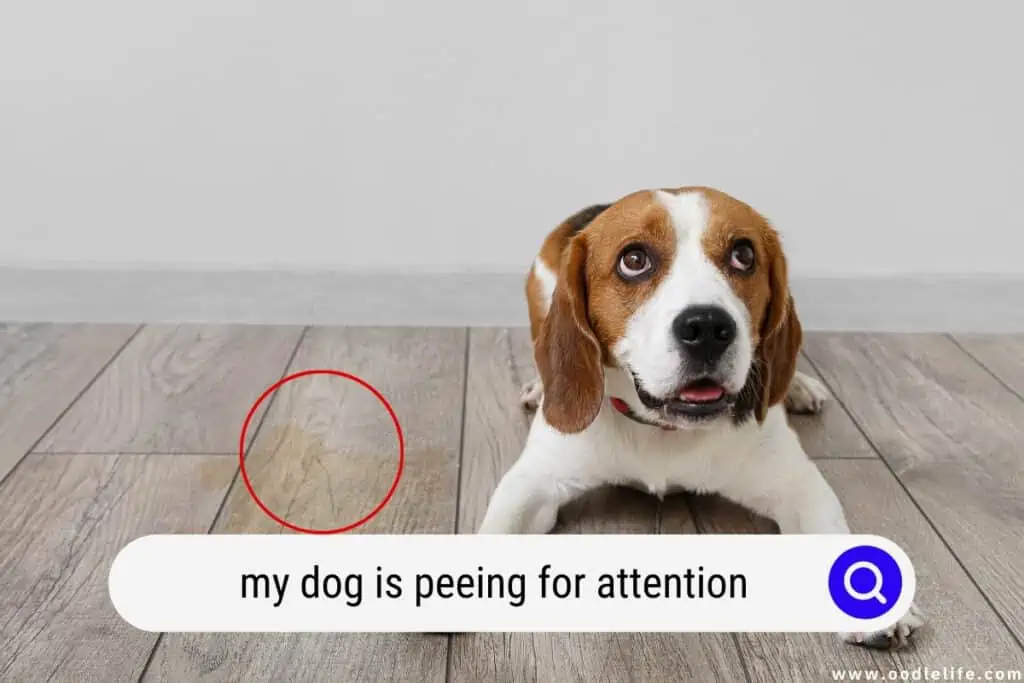
Do Dogs Pee For Attention?
What do you do when your dog pees in the middle of the living room on your favorite rug? You could be correcting your dog calmly, scolding him, or freaking out. Either way, he’s got your attention alright.
When your dog pees for attention, it’s more of a taught and learned behavior. Your dog understands that by doing so, he’ll almost certainly get your attention, whether negative or positive.
If your canine is housetrained but begins to make small puddles at irregular times, this could be a way of attracting your attention.
Whether your dog is peeing due to attention-seeking behavior or an underlying medical issue, there are a few things you should avoid doing when trying to resolve the problem, like losing your cool and yelling at your pooch.
Getting harsh and acting on it will almost certainly backfire and cause your dog to be confused, fearful, or worse.
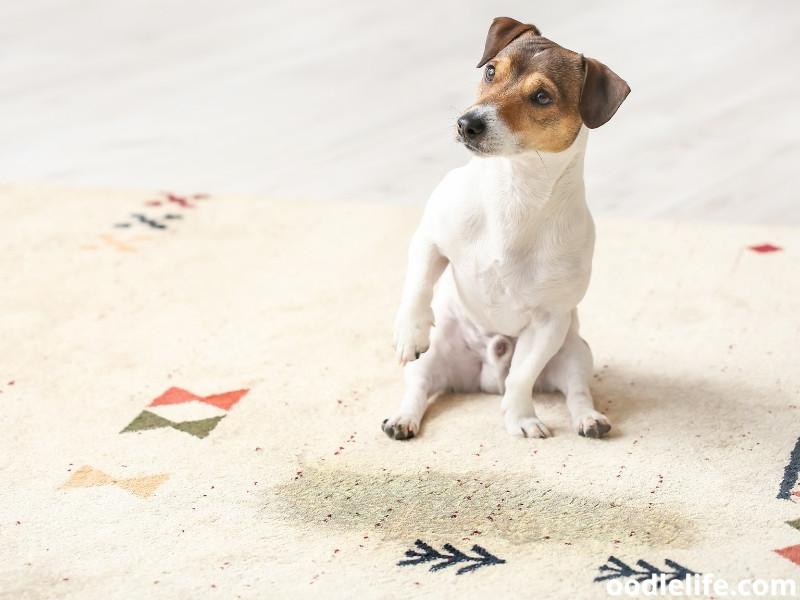
Why Do Dogs Pee In The House?
Let’s take a look at the most common reasons for your dog’s accidents.
Peeing in Submission
Submissive peeing is a normal way for dogs to show deference or respect to another individual, usually a human. By urinating, the dog is saying, “I know you are the alpha in this pack.” Although it may be seen as a sign of weakness by some, submissive peeing is actually a sign of good training.
A dog that has been properly trained knows its place in the hierarchy and is less likely to challenge an authority figure. In addition, submissive peeing can be a sign of excitement or happiness.
If your dog greets you with a wagging tail and a puddle of urine at your feet, it’s probably just expressing its joy at seeing you. There’s no need to punish a dog for submissive peeing, as it is a natural part of canine behavior.
Fortunately, there are a few things you can do to help your dog overcome this shyness and keep her from submissive peeing. First, avoid scolding or punishing your dog for accidents; this will only make her more fearful and increase the chances of accidents happening again.
Second, provide plenty of opportunities for your dog to socialize with other dogs and people; this will help her to become more confident and less likely to feel the need to submit.
Finally, be patient and consistent in your training; with time and patience, your dog will learn that there’s no need to submit when she’s around you and your friends.
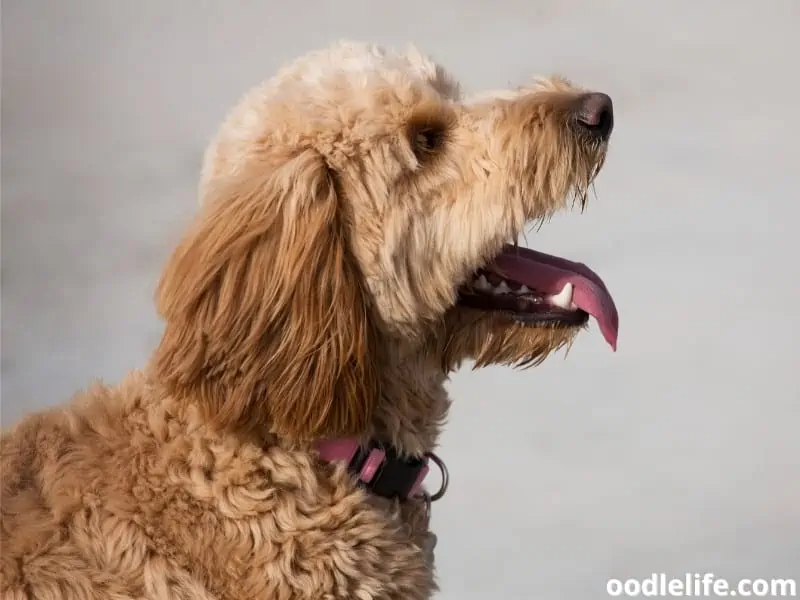
Boredom
If you work from home and separation anxiety isn’t a problem, your dog may well be peeing from boredom or the want to attract your attention. He understands that peeing in the middle of the room will force you to get up and respond to him.
Because you can’t spend all of your time entertaining your dog, don’t give him what he wants, which is attention, to stop this type of undesirable behavior. Ignore the dog and clean up the puddle. If necessary, evict him from the area.
Make an effort to extend the time you spend walking with your dog. Take a 30-minute tour of the area instead of bringing him out in the morning for a short potty. Allow him to smell around trees and lampposts for passers-by or interact with other canines.
This will keep your dog occupied as he will have something to think about for the next several hours, and a little walk will likely burn off any surplus energy, allowing him to snooze for a few hours.
Giving him loads of mental stimulation when you aren’t capable of giving him attention is also a great way to keep your pooch occupied. A treat-dispenser puzzle toy or a Kong stuffed with frozen peanut butter should keep your attention-seeking pooch busy for a couple of hours.
He’ll be occupied for a long time figuring out how to get to the tasty snacks, and all the excitement may put him to sleep later.
You can also offer him a large bone to gnaw if he’s in the same room as you can look after him. Just be sure that you’re around to watch him if he is chewing on a bone or dental chew.
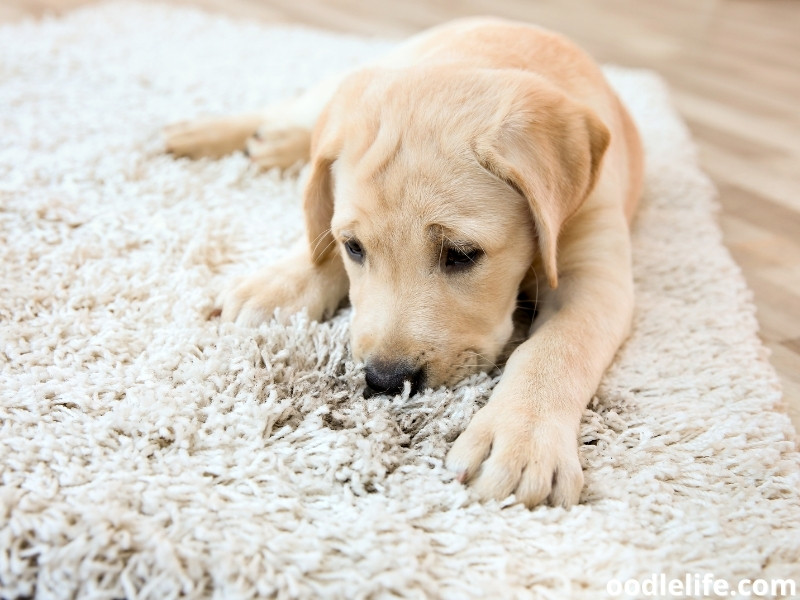
Separation Anxiety
Separation anxiety affects a vast number of dogs, even the most confident, balanced ones. Not only do dogs dislike being left alone, but they also have no way of knowing when you’ll return.
Because a dog doesn’t comprehend what it means to go to work, they may be concerned that you won’t return.
You don’t have to assume it’s an intentional act if your pup pees on the floor as if it were a spiteful act just as you’re putting your coat on. He might just pee because he’s worried you’ll leave the house. To put it another way, he may not be doing it on purpose, but rather because he can’t stop himself.
The fundamental goal of conditioning away separation anxiety is to gradually increase the length of your absence. Leave the house at every hour for the first few days, but return five minutes later.
After that, try leaving for 20 minutes, then 40 minutes, gradually increasing the time your dog spends away from you.
Separation anxiety is a common condition that if left unchecked, can escalate into serious behavioral problems that are difficult to correct. If in doubt, check with a canine behavioral professional and don’t let the situation get out of hand.
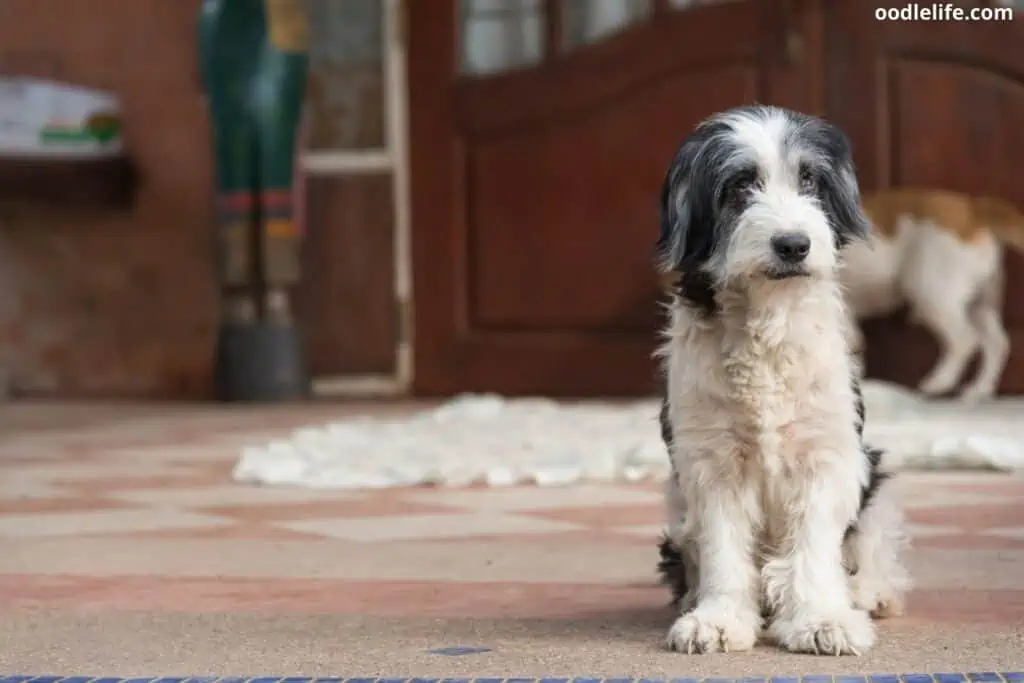
Jealousy
Ever notice how your dog seems to get a little extra excited when you come home from work, or how they might sulk a bit when you show attention to someone else? It might seem like they’re acting out of spite, but in reality, they’re just acting as any other jealous person would.
Dogs or any other pets do not like to share their favorite human’s attention, care, and love with anyone. Your dog may pee unnecessarily in an attempt to catch your attention if there are any changes in your family’s life. At the same time, most experts classify this type of peeing as territory-marking.
Also, you can expect some sort of attention-seeking peeing if you bring home a new pet. If you’re fussing over the new pet, a quick pee is a sure way of getting some attention. It’s also a way of letting the newcomer know this is his territory.
Dogs are social creatures that crave attention and love, so it’s only natural that they would feel a twinge of jealousy when they see someone else receiving the affection that they desire. While a little bit of jealousy can be cute, it’s important to make sure that it doesn’t lead to aggression or possessiveness. After all, nobody likes a green-eyed monster.
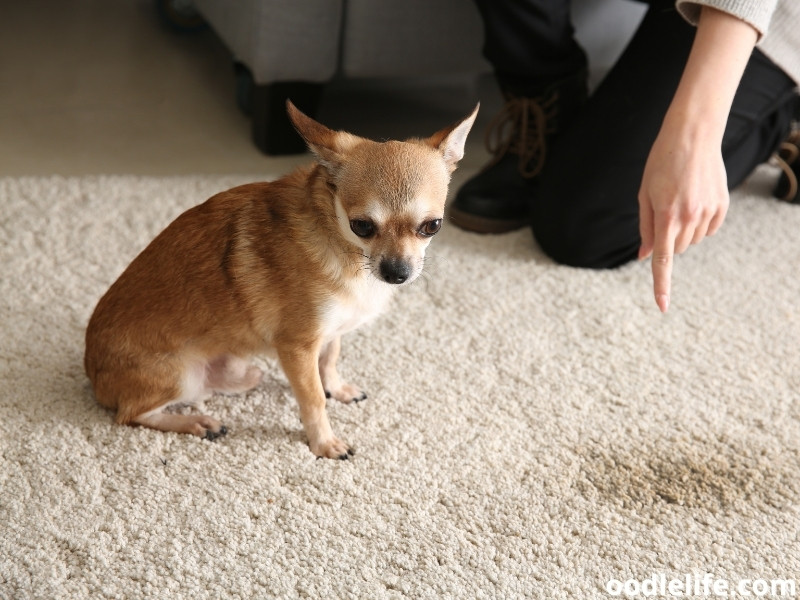
Excitement Peeing
Peeing is a common way for sensitive canines to express their joy. It’s not something he does on purpose; he simply loses control of his bladder due to the excitement.
This may occur when the dog is emotionally overwhelmed by guests, or it may occur as a method of greeting you after a period of absence.
If the canine is prone to emotional peeing, try to reduce the excitement. For example, don’t make a big deal over the dog when your guests arrive. Ask the visitors or guests to avoid your dog for now, and only acknowledge him once your furry friend has calmed down and become acclimated to their presence.
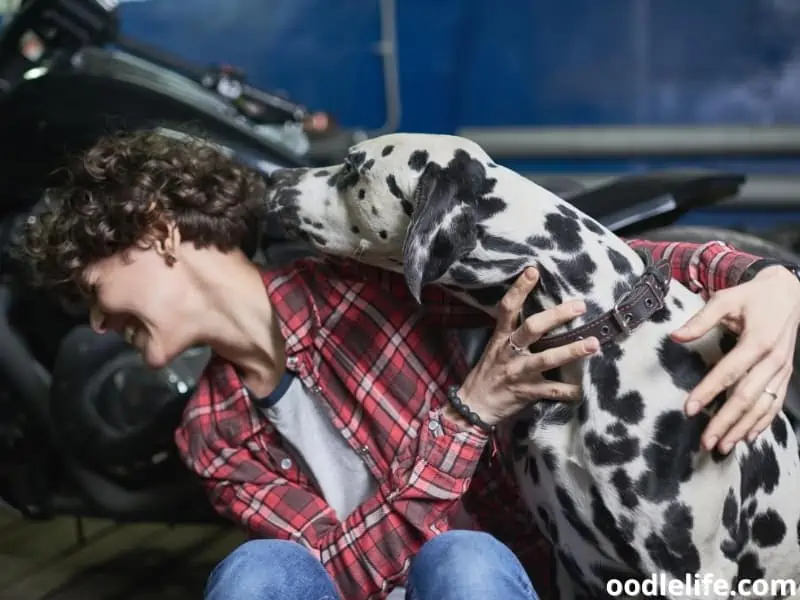
Medical Problems
It’s never a good idea to dismiss the likelihood of a medical problem, especially if you have ruled out all the possibilities of behavioral problems.
While involuntary urination in dogs can be caused by a number of medical problems, the most common culprit is incontinence. Incontinence occurs when the muscles that control the release of urine are weakened or damaged. This can be due to a variety of factors, including age, injury, or illness.
Other medical problems that can cause involuntary urination include urinary tract infections, diabetes, bladder stones, and kidney disease. If your dog is experiencing involuntary urination, it is important to take them to the vet for an evaluation.
Only a certified veterinary professional can determine the underlying cause and develop a treatment plan. With proper diagnosis and treatment, most dogs with involuntary urination can live happy and healthy lives.
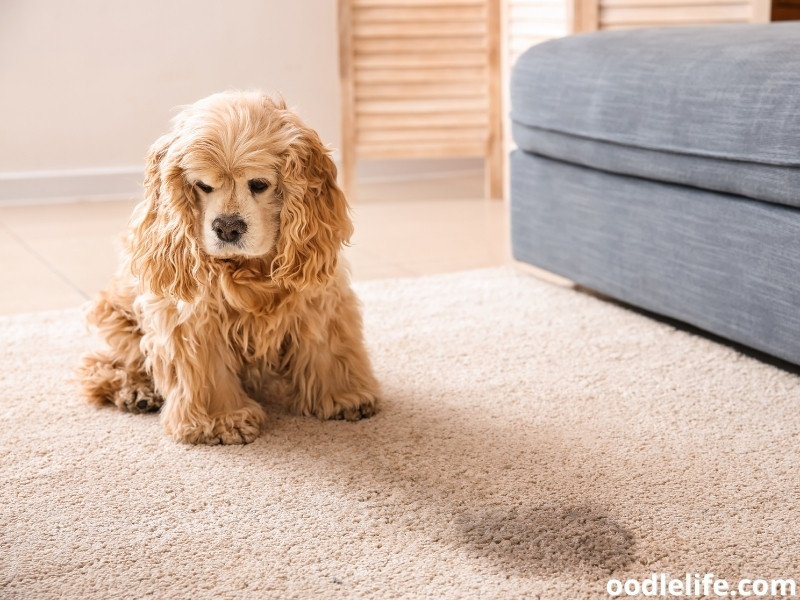
Final Thoughts
Many dog owners might wonder why their well-trained pooches pee on the floor and whether it’s somehow a way of asking for attention. There are numerous reasons why they do what they do, so make sure you examine all of them!